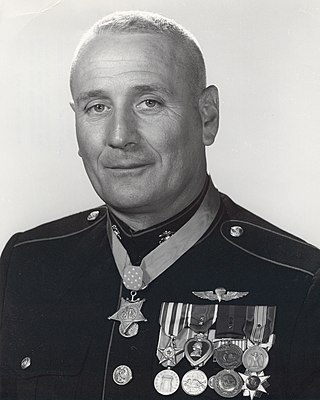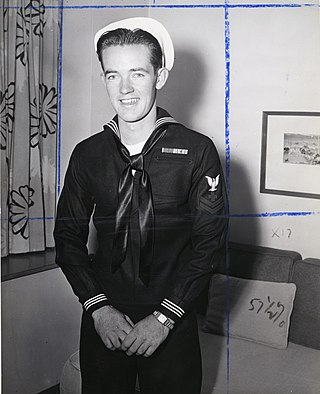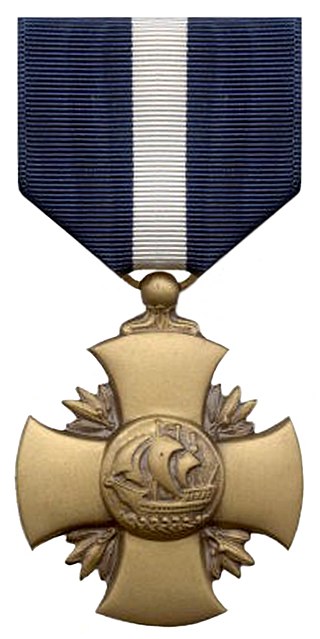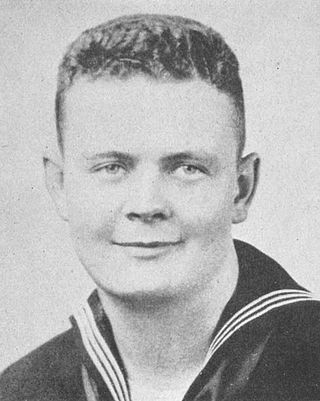
Wesley Lee Fox was a highly decorated United States Marine Corps colonel with 43 years of service. Fox was a combat veteran – receiving the Medal of Honor for his heroic actions during the Vietnam War – and is considered one of the Marine Corps' legendary heroes. After retiring from the Marine Corps, he wrote a book about his career: Marine Rifleman: Forty-Three Years in the Corps; and, he served for 8 years as deputy commandant for the Virginia Tech Corps of Cadets.

David Robert "Bobby" Ray was a United States Navy hospital corpsman second class who was killed in action during the Vietnam War while assigned to an artillery battery of the United States Marine Corps. He was posthumously awarded the Medal of Honor for his heroic actions above and beyond the call of duty on March 19, 1969.

William Richard Charette was a United States Navy master chief hospital corpsman who received the nation's highest military decoration for valor, the Medal of Honor. He was awarded the medal for heroic actions "above and beyond the call of duty" on March 27, 1953, while assigned to a Marine Corps rifle company during the Korean War. He retired from the Navy after 26 years of service.

Alfredo Cantu "Freddy" Gonzalez was a United States Marine Corps Sergeant who posthumously received the Medal of Honor for service in the Battle of Huế during the Vietnam War.

Duane Edgar Dewey was an American combat Marine. He received the United States military's highest decoration for valor, the Medal of Honor, for his actions on April 16, 1952, during the Korean War. Although wounded by an enemy grenade, he smothered another exploding grenade with his own body to save the life of a corpsman and the other Marines around him.

Jimmie Earl Howard was a Marine Corps staff sergeant when he led an eighteen-man reconnaissance patrol in a fierce battle against a battalion of Viet Cong in June 1966. As a result of his heroic actions, Howard became the sixth U.S. Marine to be awarded the nation's highest honor for heroism in combat in Vietnam. The Medal of Honor was presented by President Lyndon B. Johnson in White House ceremonies on August 21, 1967.

Master Sergeant Richard Allan Pittman was a United States Marine who received the Medal of Honor for his heroic actions on July 24, 1966, during the Vietnam War.

George E. Wahlen was a United States Army major who served with the United States Navy as a hospital corpsman attached to a Marine Corps rifle company in World War II and was awarded the U.S. military's highest decoration for valor, the Medal of Honor, for heroism above and beyond the call of duty during the Battle of Iwo Jima. He was an Army officer in the Korean War and was wounded in the Vietnam War.

Vincent Robert Capodanno Jr., M.M. was a Catholic priest and Maryknoll Missioner killed in action while serving as a Navy chaplain with a Marine Corps infantry unit during the Vietnam War. He was a posthumous recipient of America's highest military decoration, the Medal of Honor, for heroic actions above and beyond the call of duty. The Catholic Church has declared him a Servant of God, the first of the four stages toward possible sainthood.

Puerto Ricans have served as members of the United States Armed Forces and have fought in every major conflict in which the United States has been involved from World War I onward. Many Puerto Ricans, including those of Puerto Rican descent, have distinguished themselves during combat as members of the five branches of the U.S. Military, the Army, Marines, Navy, Air Force and the Coast Guard.

James Leroy Bondsteel was an American soldier of the United States Army who served during the Vietnam War, where he earned the Medal of Honor. His Medal of Honor, awarded in November 1973, was the last presented by President Richard Nixon.

John Harlan Willis was a United States Navy hospital corpsman who was killed in action during World War II while serving with a Marine Corps rifle company. He was posthumously awarded the nation's highest military decoration for valor, the Medal of Honor, for heroic actions "above and beyond the call of duty" on February 28, 1945, during the Battle of Iwo Jima.

Robert Ronald Leisy was a United States Army officer and a recipient of the United States military's highest decoration—the Medal of Honor—for his actions in the Vietnam War.

Robert Roland Ingram is a retired United States Navy hospital corpsman third class and a recipient of the United States' highest military decoration, the Medal of Honor, for heroism during the Vietnam War.

Bruce Alan Grandstaff was a United States Army soldier and a recipient of the United States military's highest decoration—the Medal of Honor—for his actions in the Vietnam War.

Wayne Maurice Caron was a United States Navy hospital corpsman who was killed in action while serving with a Marine Corps rifle company in the Vietnam War. For heroic actions above and beyond the call of duty on July 28, 1968, he was posthumously awarded the United States military's highest decoration for valor—the Medal of Honor.
Fred Faulkner Lester was a United States Navy hospital corpsman who was killed in action during World War II while assigned to a Marine Corps rifle company. He was posthumously awarded the nation's highest military decoration for valor, the Medal of Honor, for heroic actions "above and beyond the call of duty" on June 8, 1945, during the Battle of Okinawa.

Luis E. Fonseca, Jr. is a United States Navy hospital corpsman who was awarded the Navy Cross for extraordinary heroism on March 23, 2003, while assigned to a Marine Corps amphibious assault vehicle platoon serving with the 1st Battalion, 2nd Marine Regiment, during the Battle of An Nasiriyah in An Nasiriyah, Iraq. This was the first major battle fought in Iraq by the U.S Marine Corps during Operation Iraqi Freedom.

















